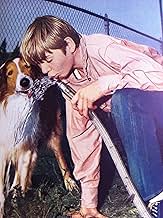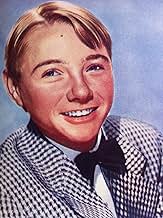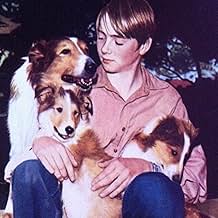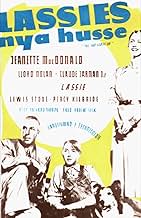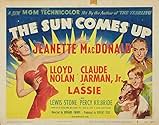AVALIAÇÃO DA IMDb
6,4/10
492
SUA AVALIAÇÃO
Adicionar um enredo no seu idiomaSet in the rural south of the United States, a bereaved war widow learns to to put aside her bitterness and grief as she grows to love a young orphan boy and the dog that belonged to her lat... Ler tudoSet in the rural south of the United States, a bereaved war widow learns to to put aside her bitterness and grief as she grows to love a young orphan boy and the dog that belonged to her late son. Punctuated with song-filled interludes.Set in the rural south of the United States, a bereaved war widow learns to to put aside her bitterness and grief as she grows to love a young orphan boy and the dog that belonged to her late son. Punctuated with song-filled interludes.
- Direção
- Roteiristas
- Artistas
Ed Agresti
- Musician
- (não creditado)
Jessie Arnold
- Townswoman at Fire
- (não creditado)
Charles Bates
- Orphan
- (não creditado)
Bobby Beyers
- Orphan
- (não creditado)
Barbara Billingsley
- Nurse
- (não creditado)
Paul E. Burns
- Dr. Sample
- (não creditado)
John Butler
- Hotel Attendant
- (não creditado)
Avaliações em destaque
THE SUN COMES UP (Metro-Goldwyn-Mayer, 1948), directed by Richard Thorpe, is a sentimental drama notable for being both movie featuring the famous collie by the name of Lassie, introduced five years earlier in LASSIE COME HOME (MGM, 1943), and the final movie appearance of opera singer/actress, Jeanette MacDonald. MacDonald has come a long way in movies by this point, making her film debut in THE LOVE PARADE (Paramount, 1929), starring Maurice Chevalier, with whom she teamed in three more musical-comedies. Aside from non-musical works for other studios such as Fox, she found both home and success at MGM starting in 1934, where the studio developed her talents more towards opera, with a new screen partner being Nelson Eddy. By the 1940s, her style of movies began to wane, marking the close for MGM by 1942. In 1948, she returned to the screen, and MGM, this time playing singing-mother roles starting with THREE DARING DAUGHTERS. Whether MacDonald intended on ending her movie career or not with THE SUN COMES UP is uncertain. At least she managed to hold her own against her scene stealing co-stars, especially from the dog named Lassie.
Plot summary: Helen Lorfield Winter (Jeanette MacDonald) is a widowed mother with a teenage son, Hank (Dwayne Hickman) with a collie, Lassie, who adores him. Since the death of her husband, Helen has devoted her time towards her family and home life. A former opera singer by profession, and through the assistance of her manager, Arthur Norton (Lewis Stone), Helen gets her new beginning returning to concert singing for the first time in three years. Her concert proves successful, but her happiness is shattered by the sudden death of her son after getting struck by a passing truck while trying to prevent Lassie from getting hit while on the street. Weeks pass. Helen gives up her career. Unable to be around people, especially children, Helen packs up her belongings to go someplace far away to forget. Though she blames Lassie for her son's death, she takes Lassie with her anyway on a car trip leading her to Bushy Gap, a hillbilly residence located somewhere in the mountains. Helen's new beginning restarts as she rents a furnished home belonging to the out-of-town, Thomas I. Chandler. She soon finds herself disliked by town folks through her attitude towards their children. Through the kindly but blunt assistance of storekeeper, William B. Willigoode (Percy Kilbride), who tells her the truth about herself, Helen's attitude soon changes, especially after meeting with a teenage boy named Jerry (Claude Jarman Jr.). After saving Lassie from a rattlesnake, Helen hires Jerry as her handyboy. Though fond of Jerry, she knows very little about him. It takes her landlord, Thomas Chandler (Lloyd Nolan), having returned from his trip, to let her figure things out for herself. Others in the cast include: Hope Landin (Mrs. Pope); Nicholas Joy (Victor Alvord); Mickey McGuire (Cleaver) and Teddy Infuhr (Junebug).
Not the typical MacDonald movie from the past, THE SUN COMES UP, actually resembles that of an episode from a "Lassie" television series a decade later. Though second billed, Lloyd Nolan comes in 63 minutes into the start of the movie, while Claude Jarman Jr., best known for his performance in THE YEARLING (MGM, 1946), takes up much of the proceedings playing a likable harmonica teenager who bonds well with Lassie. Being more drama than musical, the presence of comical types as Percy Kilbride, Margaret Hamilton and Ida Moore, highlight greatly to its lighter moment. Even MacDonald does a brief comedy turn for one scene involving snuff. Because of MacDonald's reputation as a singer, song numbers are inserted into the story, including: "Un Bel De Vedremo" from Giacomo Puccini's MADAME BUTTERFLY; "Songs My Mother Taught Me" by Antonin Dvorak; Rene Rabey's "Tes Jolies Yeux" "Cousin Ebenezer" (with MacDonald and group of orphan boys); and "If You Were Mine" by Artur Rubenstein.
THE SUN COMES UP may not be a MacDonald favorite for anyone in favor of her singing opposite Nelson Eddy in eight musicals from 1935 to 1942, or working opposite Clark Gable and Spencer Tracy in SAN FRANCISCO (MGM, 1936), but it is satisfactory screen entertainment of MGM's 93 minutes of Technicolor family style mode. Formerly available on video cassette and later on DVD, THE SUN COMES UP, can often be found on the Turner Classic Movies cable channel. (**1/2)
Plot summary: Helen Lorfield Winter (Jeanette MacDonald) is a widowed mother with a teenage son, Hank (Dwayne Hickman) with a collie, Lassie, who adores him. Since the death of her husband, Helen has devoted her time towards her family and home life. A former opera singer by profession, and through the assistance of her manager, Arthur Norton (Lewis Stone), Helen gets her new beginning returning to concert singing for the first time in three years. Her concert proves successful, but her happiness is shattered by the sudden death of her son after getting struck by a passing truck while trying to prevent Lassie from getting hit while on the street. Weeks pass. Helen gives up her career. Unable to be around people, especially children, Helen packs up her belongings to go someplace far away to forget. Though she blames Lassie for her son's death, she takes Lassie with her anyway on a car trip leading her to Bushy Gap, a hillbilly residence located somewhere in the mountains. Helen's new beginning restarts as she rents a furnished home belonging to the out-of-town, Thomas I. Chandler. She soon finds herself disliked by town folks through her attitude towards their children. Through the kindly but blunt assistance of storekeeper, William B. Willigoode (Percy Kilbride), who tells her the truth about herself, Helen's attitude soon changes, especially after meeting with a teenage boy named Jerry (Claude Jarman Jr.). After saving Lassie from a rattlesnake, Helen hires Jerry as her handyboy. Though fond of Jerry, she knows very little about him. It takes her landlord, Thomas Chandler (Lloyd Nolan), having returned from his trip, to let her figure things out for herself. Others in the cast include: Hope Landin (Mrs. Pope); Nicholas Joy (Victor Alvord); Mickey McGuire (Cleaver) and Teddy Infuhr (Junebug).
Not the typical MacDonald movie from the past, THE SUN COMES UP, actually resembles that of an episode from a "Lassie" television series a decade later. Though second billed, Lloyd Nolan comes in 63 minutes into the start of the movie, while Claude Jarman Jr., best known for his performance in THE YEARLING (MGM, 1946), takes up much of the proceedings playing a likable harmonica teenager who bonds well with Lassie. Being more drama than musical, the presence of comical types as Percy Kilbride, Margaret Hamilton and Ida Moore, highlight greatly to its lighter moment. Even MacDonald does a brief comedy turn for one scene involving snuff. Because of MacDonald's reputation as a singer, song numbers are inserted into the story, including: "Un Bel De Vedremo" from Giacomo Puccini's MADAME BUTTERFLY; "Songs My Mother Taught Me" by Antonin Dvorak; Rene Rabey's "Tes Jolies Yeux" "Cousin Ebenezer" (with MacDonald and group of orphan boys); and "If You Were Mine" by Artur Rubenstein.
THE SUN COMES UP may not be a MacDonald favorite for anyone in favor of her singing opposite Nelson Eddy in eight musicals from 1935 to 1942, or working opposite Clark Gable and Spencer Tracy in SAN FRANCISCO (MGM, 1936), but it is satisfactory screen entertainment of MGM's 93 minutes of Technicolor family style mode. Formerly available on video cassette and later on DVD, THE SUN COMES UP, can often be found on the Turner Classic Movies cable channel. (**1/2)
Even if you don't like Jeanette McDonald, and even if you don't like child actors, and even if you don't like Lassie, do yourself a favor and rent The Sun Comes Up just to listen to the main theme during the opening credits. André Previn earned a well-deserved Rag nomination for his first film composition. It's such a beautiful, layered theme that sounds exactly as it's supposed to. It sounds like a sunrise, the promise of a brighter future, and a deep inhalation after years of shallow breathing.
If you want to watch more than the opening credits, you'll get to see Jeanette McDonald in a drama where she barely sings. She starts the movie off as a successful performer, but when her young son is accidentally killed, she tells her manager, Lewis Stone, that she's going to retire and retreat into the country. She packs up her car and her grief and drives to a small mountain town where she can hopefully start over. What she doesn't yet realize is that in a small town, no one leaves you alone! The owner of the one general store, Percy Kilbride, is extremely nosy, a confusing Margaret Hamilton wants to be her friend, and the young errand boy, Claude Jarman Jr., who grows attached to her dog doesn't let her harden her heart as she'd intended.
I didn't really know what to expect out of this movie, but it was pretty enjoyable. My favorite scene was when Jeanette leaves for the countryside. She's left her son's dog, Lassie, behind because it would be too painful to continue to live with her and show her affection; her son was hit by a car while trying to get Lassie out of the middle of the road. But Lassie's lonely and confused too, and it might be some sort of comfort to love who her son loved. Jeanette's very conflicted, and it's a really powerful scene.
I kept waiting for Lloyd Nolan to show up, since he got such a high billing, but he's hardly in the movie. Instead of a romance where a mother can only move on from her tragedy by falling in love, Jeanette grows in other ways. Give this one a shot if it sounds interesting. It gets a bit corny in some parts, but keep in mind it is a Lassie movie. It's supposed to be a little corny.
If you want to watch more than the opening credits, you'll get to see Jeanette McDonald in a drama where she barely sings. She starts the movie off as a successful performer, but when her young son is accidentally killed, she tells her manager, Lewis Stone, that she's going to retire and retreat into the country. She packs up her car and her grief and drives to a small mountain town where she can hopefully start over. What she doesn't yet realize is that in a small town, no one leaves you alone! The owner of the one general store, Percy Kilbride, is extremely nosy, a confusing Margaret Hamilton wants to be her friend, and the young errand boy, Claude Jarman Jr., who grows attached to her dog doesn't let her harden her heart as she'd intended.
I didn't really know what to expect out of this movie, but it was pretty enjoyable. My favorite scene was when Jeanette leaves for the countryside. She's left her son's dog, Lassie, behind because it would be too painful to continue to live with her and show her affection; her son was hit by a car while trying to get Lassie out of the middle of the road. But Lassie's lonely and confused too, and it might be some sort of comfort to love who her son loved. Jeanette's very conflicted, and it's a really powerful scene.
I kept waiting for Lloyd Nolan to show up, since he got such a high billing, but he's hardly in the movie. Instead of a romance where a mother can only move on from her tragedy by falling in love, Jeanette grows in other ways. Give this one a shot if it sounds interesting. It gets a bit corny in some parts, but keep in mind it is a Lassie movie. It's supposed to be a little corny.
This is a movie that may be a bit corny by modern measure but a wonderful film to sit down with a young child and watch. Old time values--a slice of life with real problems---a happy ending.
Jeannette MacDonald (as Helen Lorfield Winter) is an opera singer making a comeback, after three years of mourning for her deceased husband. She is devoted to her son, and he is devoted to his dog, Lassie. After a successful comeback concert, Ms. MacDonald's son is killed in a horrific accident; he is hit by a truck while running for Lassie. MacDonald is understandably devastated. Initially, she blames Lassie for contributing to her son's death, but MacDonald is able to forgive Lassie, and she comes to care for the dog as her son would have wished. Pained by the sound of children playing, MacDonald takes Lassie, and moves to the country, where she hopes to enjoy a life of solitude. Then, she and Lassie meet young Claude Jarman Jr. (as Jerry), from a neighboring orphanage
The sentimental storyline in "The Sun Comes Up" is most predictable; but, it hardly matters, as the film does what it does well. First of all, this (the fifth in the original series) is the best "Lassie" since the 1943 original. Richard Thorpe is an unexpected success, seamlessly directing a seemingly difficult mix of children, seasoned professionals, and Lassie. In her last feature film, Jeannette MacDonald could not have been more capable; certainly, she ends her movie career on a high note. Jarman Jr., of "The Yearling" is a well-chosen Lassie co-star. Lassie performs expertly. André Previn provides an appropriately swell score. The film ends with a well-done fiery rescue.
When the film threatens to become too predictable, or sentimental, you can enjoy delightful supporting pros, like: Lewis Stone (an MGM classic), Percy Kilbride ("Pa Kettle"), and Margaret Hamilton (Oz' Wicked Witch). Tarzan's "boy" Johnny Sheffield appears (to have hanged up his loincloth). Other kids making impressions are: Dwayne Hickman ("Dobie Gillis") as "Hank", Teddy Infuhr (also from the "Ma and Pa Kettle" series) as "Junebug", and Michael McGuire (who'll possess the "Dark Shadows" cast in 1970) as "Cleaver".
******* The Sun Comes Up (1/27/49)) Richard Thorpe ~ Jeanette MacDonald, Claude Jarman Jr., Lloyd Nolan, Lassie
The sentimental storyline in "The Sun Comes Up" is most predictable; but, it hardly matters, as the film does what it does well. First of all, this (the fifth in the original series) is the best "Lassie" since the 1943 original. Richard Thorpe is an unexpected success, seamlessly directing a seemingly difficult mix of children, seasoned professionals, and Lassie. In her last feature film, Jeannette MacDonald could not have been more capable; certainly, she ends her movie career on a high note. Jarman Jr., of "The Yearling" is a well-chosen Lassie co-star. Lassie performs expertly. André Previn provides an appropriately swell score. The film ends with a well-done fiery rescue.
When the film threatens to become too predictable, or sentimental, you can enjoy delightful supporting pros, like: Lewis Stone (an MGM classic), Percy Kilbride ("Pa Kettle"), and Margaret Hamilton (Oz' Wicked Witch). Tarzan's "boy" Johnny Sheffield appears (to have hanged up his loincloth). Other kids making impressions are: Dwayne Hickman ("Dobie Gillis") as "Hank", Teddy Infuhr (also from the "Ma and Pa Kettle" series) as "Junebug", and Michael McGuire (who'll possess the "Dark Shadows" cast in 1970) as "Cleaver".
******* The Sun Comes Up (1/27/49)) Richard Thorpe ~ Jeanette MacDonald, Claude Jarman Jr., Lloyd Nolan, Lassie
Nice, simple family film, a bit dated but still with enough charm and humor to make it agreeable--based on a novel by Marjorie Kinnan Rawlings, author of 'The Yearling'. Jeanette has her bitterness melted by Claude Jarman, Jr. and Lassie when she decides to retreat to the country to forget about the death of her son. An above-average Lassie film with a rather predictable ending after a tense fire sequence in which he rescues Claude Jarman, Jr. from a burning loft. A few nice songs by Jeanette, beautiful settings and some amusing performances by Percy Kilbride, Margaret Hamilton and others. Lloyd Nolan turns up for a cameo role. Pleasant entertainment. The blurb on the VHS copy I have cites a quote from the N.Y. Times which is so accurate: "Simple and sweet...Jeanette MacDonald has never looked lovelier."
Você sabia?
- CuriosidadesSol da Manhã (1949) is mainly based on the 1936 short story "A Mother in Mannville" by Marjorie Kinnan Rawlings. According to the University of South Carolina Libraries description of Rawlings' works, in 1946 MGM asked Rawlings to do a story that could star Lassie with Claude Jarman Jr.. Rawlings started with her 1936 short story "A Mother in Mannville." MGM bought the rights to Rawlings' unpublished story "A Family for Jock," re-titled it "Mountain Prelude," and sold the literary rights to The Saturday Evening Post. The story appeared The Post as a six-part serial during April 26 to May 31, 1947. But it has never been published in novel form.
- Erros de gravaçãoWhen Jerry finally decides to go play with Lassie, we can hear someone off-screen give Lassie a command. Right after Jerry says,"Let's have fun now," and hugs Lassie, a man's voice clearly speaks a word off-camera, and Lassie looks in that direction before running off with the boy.
- Trilhas sonorasUn Bel Di
(uncredited)
from "Madama Butterfly"
Music by Giacomo Puccini
Libretto by Luigi Illica and Giuseppe Giacosa
Sung by Jeanette MacDonald
Principais escolhas
Faça login para avaliar e ver a lista de recomendações personalizadas
Detalhes
- Data de lançamento
- País de origem
- Idioma
- Também conhecido como
- The Sun Comes Up
- Locações de filme
- Empresa de produção
- Consulte mais créditos da empresa na IMDbPro
- Tempo de duração1 hora 33 minutos
- Proporção
- 1.37 : 1
Contribua para esta página
Sugerir uma alteração ou adicionar conteúdo ausente

Principal brecha
By what name was Sol da Manhã (1949) officially released in India in English?
Responda

